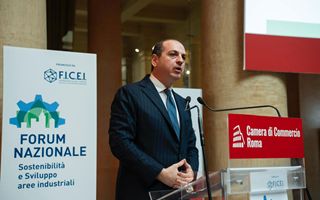(Finance) – “La energy transition, independence from fossil fuels and environmental sustainability are the next challenges that our country is called to face. Challenges that the political and business classes cannot avoid. We need to all work together, in the same direction, so that in the near future Italy is at the forefront of this epochal revolution.”
Antonio Visconti, president of Ficei and number one of the ASI of Salernoleaves no room for hesitation during the “National forum for sustainability and development of industrial areas“, which was attended among others by the deputy minister Vannia Gava, the vice-president of Confindustria Vito Grassi, the senator Gianluca Cantalamessa, the deputies Michele Gubitosa and Piero De Luca, and the president of Svimez Adriano Giannola.
During the two days we discussed not only ecological transition and the role of industrial areas and consortia, but also how politics must help the country reach the challenging goal of climate neutrality in 2050. A goal that can, and must, be achieved not only from a purely ideological point of view. In this sense the experience of the Asi can play a fundamental role. “The production areas represent not only the fulcrum of Italian industry but also the theater of a possible ecological and economic rebirth”, explains Visconti. “Industries operate within highly specific contexts. It is here that the crucial role of Asi emerges, local government bodies, called to contribute with innovative ideas and concrete projects. These interventions range from ensuring correct waste disposal to promoting energy independence through the installation of production systems from renewable sources”.
During the event, “the collaboration with the ESG Observatory of the La Sapienza University of Rome was also made official, which aims to introduce evaluation criteria that take into account the environmental, social and governance impact of organizations, underlining the importance of a sustainability budget that goes beyond mere financial profit”. In this context, the case study of Buccino, in the province of Salerno, was cited, which offers an emblematic insight into how innovation and resilience can transform a crisis into opportunity.
Visconti goes into detail “A company, previously dependent on foreign gas, revised its energy supply, after the outbreak of the war between Ukraine and Russia, choosing a storage technology created by an industry that was just a few meters from its factory that he didn’t even know. The two companies were put in contact by Enel X, therefore by a national entity that was following the energy reconversion project, and created this interconnection. Practical demonstration of how to achieve energy independence can guarantee greater economic stability and a lower impact of gas price fluctuations on the company balance sheet. This virtuous example highlights the potential of energy storage systems and presents Italy with the possibility of taking on a leading role in the global energy transition.”
The energy transition represents for Italy not only an environmental necessity but also an opportunity for unprecedented industrial development. “The country – underlines the number one of Ficei – has the opportunity to reduce its dependence on fossil fuels, while at the same time stimulating the birth of new production sectors and skills. The consortia of the Industrial Development Areas (ASI) play a key role, acting as a glue between the different corporate entities and coordinating initiatives for an efficient energy transition. The ability to adapt urban planning and building regulations, as well as the management of energy infrastructures, are concrete examples of how these bodies can support businesses on the path towards energy self-sufficiency”.
The energy transition is not only an ecological imperative but an opportunity for economic revival for Italy. For the president of the Federation, the “challenges are many, but the solutions proposed represent a replicable model of sustainable development which lays the foundations for a new industrial paradigm. Buccino’s example demonstrates how, through technological innovation and collaboration between entities public and private, it is possible to overcome structural barriers and create a resilient, competitive and environmentally friendly production system”. The path is clear: Italy has all it takes to lead the transition towards a clean and sustainable energy future.
